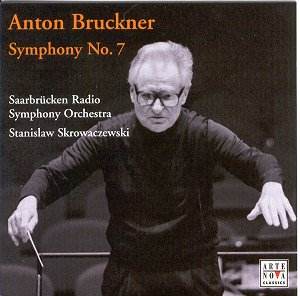The completion and issue/reissue of the complete cycle of Bruckner symphonies
on Arte Nova, played by Stanislaw Skrowaczewski and the Saarbrücken
Radio Symphony Orchestra, has been one of the highlights of the year.
This recording of the Seventh Symphony is actually
a full ten years old, dating from September 1991 and first released
several years ago. Now it is back in the catalogue and takes its worthy
position in the canon of these fine performances. For once again Skrowaczewski
proves his calibre as a Bruckner conductor, and once again the Saarbrücken
orchestra match his demands with first class playing.
There is only one issue concerning editions with this
piece, of course. That is the question of whether or not there should
be a cymbal clash at the peak of the climax in the great slow movement.
This performance opts for the Nowak edition, which means the cymbal
clash is included (in the Haas edition it is not). In fact it turns
out that it makes little impact, both musically and sonically, and in
that sense it is the most disappointing aspect of the performance. Now
it may seem strange to write of a single cymbal clash being so important,
since in many works - Tchaikovsky's Fourth Symphony, for example - such
things are 'two a penny' - but in Bruckner the serious tone of the development
is such that a single moment of arrival means everything. Here that
moment doesn't really come off, though thankfully there are other strengths
in abundance, most notably the magnificent sonority of the orchestral
playing in the fully scored passages.
The tempi have that subtlety of tension and relaxation
with marks out all the best Bruckner interpretations. For example, the
first movement opens gloriously, with one of the composer's most inspired
themes played with wonderful sonority, and phrasing which allows the
music to breath and grow. Then the more rhythmic contours of the secondary
material make for an ideal balance as the large structure is built across
its twenty-minute span.
The slow movement is deeply serious, at once majestic
and noble. Skrowaczewski plays it as a genuine Adagio, releasing the
inspired themes stage by stage and with a long term vision. The results
are compelling, which is why the relative under-achievement (sonically
speaking) of the biggest climax of all is only a minor problem. At the
end of the movement, the 'funeral music for the master', as Bruckner
called his tribute to Wagner is glowing and deeply felt.
The Scherzo has abundant energy, and the principal
trumpet plays at the top of his form in leading the way. The finale
links back to the first movement material, the faster pulse broadening
at the close with the return of the principal theme. For this is a glowing,
beautifully judged performance. If the recorded sound is not quite as
good as Arte Nova provide in other performances in the series, it is
still perfectly acceptable. So at bargain price there is no reason for
collectors to hesitate.
Terry Barfoot

![]() Orchestra/Stanislaw Skrowaczewski
Orchestra/Stanislaw Skrowaczewski ![]() ARTE NOVA 74321 27771-2 [68.45]
ARTE NOVA 74321 27771-2 [68.45]